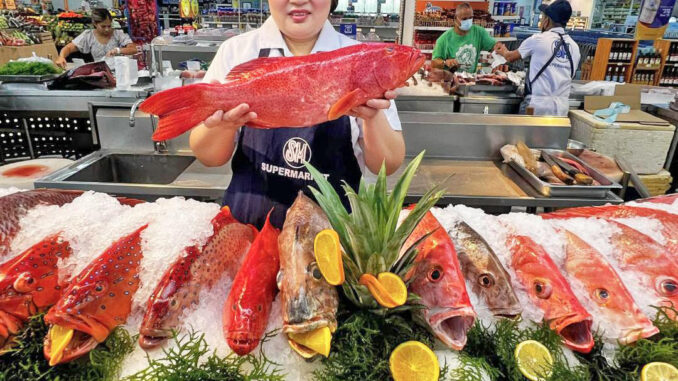
SM Markets, a chain of food retail stores under the SM Group, said it strives to integrate sustainable practices with its partners.
“At SM, our goal is to be a catalyst for responsible development in the communities we serve. We are continually finding ways to be more sustainable in our operations and bring our partners along on this journey,” said SM Supermarket president Jojo Tagbo.
Some partners who started their sustainable efforts are Sanicare, Royal Breadhaus and Under the Sea. From local supplier to seafood leader, Under the Sea prioritizes sustainable fishing practices to protect marine ecosystems
Under the Sea, based in Cagayan de Oro, brings a legacy of seafood excellence and sustainability to their partnership with SM Supermarkets.
Founded over two decades ago by Christine Biongcog and her husband, the company expanded from a local supplier to a significant player in the seafood market, thanks to SM’s support and collaboration.
Biongcog recognizes the vulnerability of her industry to climate change.
Through collaboration with government agencies like the Bureau of Fisheries and Aquatic Resources, Under the Sea has embraced innovative fishing practices such as Norwegian fish cages and sustainable methods for raising tilapia and bangus.
“Working closely with the government allows us to stay informed about the latest advancements in sustainable fishing practices, minimizing environmental impact while maximizing yield,” Biongcog said.
Biongcog’s commitment extends to personally overseeing fishing practices, often joining fisherfolks to ensure they adhere to responsible methods. This hands-on approach not only guarantees the quality of their seafood but also fosters a culture of accountability and respect for marine ecosystems.
Meanwhile, Sanicare is a popular hygiene product founded by Renato Sio in 1996. Its mission is to offer high-quality, chemical-free products to consumers.
Sio’s company, Sanitary Care Products Asia Inc., has been an SM supplier partner since 2000.
Sanicare’s commitment to sustainability is evident in its comprehensive environmental and social initiatives.
The company sources paper from sustainable tree farms and avoids harmful chemicals in its products, demonstrating a strong dedication to eco-friendly practices.
The dedication extends to their product offerings, including oxo-biodegradable trash bags designed to break down over time and cutlery made from starch, a sustainable alternative to traditional plastic.
In partnership with the Haribon Foundation, Sanicare supports tree planting and biodiversity conservation, further contributing to local environmental preservation.
Sanicare also invests in its employees and the local economy, employing over 500 people and offering financial support through savings and loan cooperatives approved by the Central Bank.
These initiatives are part of Sanicare’s broader commitment to social responsibility.
Meanwhile, Emil and Vivian Sison’s Royal Breadhaus has grown from a small local shop to a major industry player with a strong focus on environmental and community responsibility.
Royal Breadhaus, founded in Davao in 1985, has evolved from a small local bakery into a major player in the industry, now offering over 300 products across Mindanao
With over 300 products now offered across three SM malls and seven SM Savemore stores in Mindanao, Royal Breadhaus’s partnership with SM reflects a shared commitment to growth and sustainability.
The company has integrated sustainability into its core operations through several key initiatives.
Their Environmental Monitoring Program (EMP), implemented in 2017, addresses power, fuel, food waste, packaging, and water usage.
“We recycle and upcycle waste, repurposing food scraps into fertilizers and fish feed for local ecosystems like the Samal Island fish sanctuary. This initiative reflects our proactive approach to minimizing environmental impact,” Emil said.
Royal Breadhaus has also made substantial strides in renewable energy.
“All three of our plants now run on solar power for six hours daily, reducing our energy consumption by 40 percent,” Vivian said.
The shift underscores their commitment to reducing their carbon footprint. They prioritize local sourcing for ingredients such as sugar, eggs, vegetables, and poultry.
By supporting local farmers and ensuring high product quality, Royal Breadhaus further minimizes its environmental impact.
Their commitment extends beyond environmental practices to social impact, as they actively support a local orphanage and provide equipment, flour, and baking training to foster local entrepreneurship.
Through innovative approaches and shared dedication to sustainability, the SM Markets and its supplier-partners are shaping responsible production and greener shopping habits for customers.
These efforts underscore the importance of sustainable practices in driving positive change proving that businesses can succeed while contributing meaningfully to the environment and society.


Be the first to comment